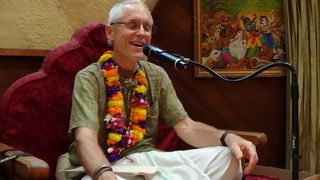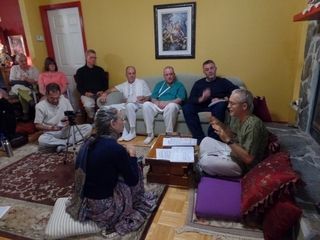
By developing genuine devotional qualities, one’s understand of God becomes clear and perfectarjuna uvacasenayor ubhayor madhyeratham sthapaya me ‘cyutayavad etan nirikse ‘hamyoddhu-kaman avasthitankair maya saha yoddhavyamasmin rana-samudyame
“Arjuna said: O infallible one, please draw my chariot between the two armies so that I may see who is present here, who is desirous of fighting, and with whom I must contend in this great battle attempt.”
Arjuna wanted to see with whom he had to fight. He had no desire to fight. He was fighting unwillingly. Although he is a ksatriya and his duty was to kill, especially on behalf of Krishna , hewas not eager to kill anyone, because he was a Vaisnava.
One reason why Krishna comes to this world is to give protection to His devotees (paritranaya sadhunam). Sadhu means a devotee, not someone who wears saffron dress and smokes bidi’s.The sastras explain the qualities of a sadhu:
titiksavah karunikah suhrdah sarva-dehinam ajata-satravah santah sadhavah sadhu-bhusanah (Bhagavatam 3.25.21)
Sadhu is titiksava – he tolerates all kinds of miserable conditions; he is never disturbed. Yasmin sthito na duhkhena gurunapi vicalyate (Gita 6.20-23): “Being situated in such a position, one is never shaken, even in the midst of greatest difficulty.” A sadhu, who has got the shelter of Krishna , even if he is placed in the most dangerous condition, is never disturbed. Just like Prahlada Maharaja. His father put him in so many dangerous conditions; he even gave him poison. Prahlada knew it was poison, but he thought, “Father is giving me poison. Who can check?All right, let me drink. If Krishna likes, He will save me.” This is the position of sadhu: in all circumstances, he is tolerant.
Although a sadhu is titiksavah, or undisturbed, he is karunikah, merciful to others. Just like Jesus Christ. While being crucified, he was praying: “God, these people do not know what they are doing. Please excuse them.” This is sadhu. They are suffering for want of God consciousness, Krishna consciousness. So even up to the point of death, he is trying to preach Krishna consciousness. “Let the people be benefited. What is this material body? Even if I am killed – actually my body will be killed, not me – that is alright.” This is sadhu: He is tolerant and merciful at the same time.
A person who is disturbed cannot do any beneficial work to any others: “No, I am very much disturbed. Don’t talk with me.” But a sadhu goes on benefiting the people in general. He does not just do mundane humanitarian work, which cares only for humans, but serves all kinds of living entities (suhrdam sarva-bhutanam).
One rascal has manufactured this idea of daridra-narayana, or Narayana in the form of a poor human being. He says the poor man has become Narayana, but he does not mind killing and feeding on the goat-Narayana. We are not talking of this kind of sadhu. A real sadhu will not allow any kind of killing.
In the Christian religion, one of the injunctions is “Thou shalt not kill.” But today Christians are managing some of the biggest slaughter houses in the world. What kind of Christianity is this? It has become very difficult to find out a true Christian, although they claim, “We are Christians.”
A real sadhu does not allow any killing. Animals are living entities, so how can we say they have no soul? All the symptoms of possessing the soul that are found in humans are found in animals too. A man also eats, the animal also eats; the man sleeps, the animal also sleeps; the man enjoys sex life, the animals also enjoy sex life; the man defends, the animals also defend. What is the missing thing in an animal that makes us think they have no soul?
The Christians have now changed the commandment “Thou shalt not kill” to “Thou shalt not murder,” because the term murder applies to only human beings. But Lord Jesus Christ never said like that. The commandment “Thou shalt not kill” applies to both humans and animals – and even trees. You cannot unnecessarily kill anyone.
Krishna consciousness means to become kind to everyone. Therefore we say, “No meateating.” We take only Krishna prasadam. As God, Krishna can eat anything, but still He recommends, patram puspam phalam toyam yo me bhaktya prayacchati (Gita 9.26). Why? Because we have to take Krishna’s prasada, so He is recommending, “These things you can offer Me.” So that is our food. As devotees of Krishna , we are meant for eating the remnants of foodstuff offered to Krishna .
If you want to conquer the tongue, then you fix up your mind that you shall not take anything that is not offered to Krishna . Tara madhye jihva ati lobha maya sudurmati. Tongue (jihva) is the bitterest enemy of the living being. It is always dragging us: “Give me this wine immediately. Give me tea immediately. Give me this cigarette immediately. Give me this meat.” If we stick to eating Krishna -prasada, then naturally the unwanted things will stop.
So if all human beings become vegetarians – not just vegetarians, but eaters of the Krishna’s prasada – all these liquor shops, slaughterhouses and brothels will be closed. This is Krishna consciousness movement. We want to close these nonsense places of sinful life: brothels, illegitimate sense gratification, gambling dens and prostitution. If we are embarrassed with this sinful life, there is no possibility of becoming again acyuta. We remain cyuta, or fallen.
Some rascal philosophers preach, “Oh, religion has nothing to do with your eating. You can eat anything you like, and still you become a religious man.” This is all nonsense. Nobody can become religious if he is attracted to sinful activities. You must stop sinful activities. That is the first condition. Otherwise you cannot understand what God is.
People have got no clear conception of God because they are sinful. But we can give the name, address and everything about God through this Krishna consciousness movement. We give them a clear conception, not just a vague idea, “God may be like this, God may be like that.”
Here is a clear description of God:
venum kvanantam aravinda-dalayataksambarhavatamsam asitambuda-sundaraìgam kandarpa-koti-kamaniyavisesa- sobham govindam adi-purusam tam aham bhajami (Brahma-samhita 5.30)
This is not the imaginary description of Krishna by some poet. This is Krishna’s actual description as described in the sastra. Syamasundara Krishna , or Muralidhara, is playing on His flute (venum kvanantam). Aravindadalayataksam: His eyes are just like petals of the lotus flower. Barhavatamsa: there is a peacock feather on His head. Kandarpakoti- kamaniya-visesa-sobham: He is so beautiful that His beauty can cut down the combined beauty of thousands of Cupids.
When God, Krishna , came on this planet, His features matched this description. This painting of Krishna is not an artist’s imagination. This is exactly how Krishna looks. Here is the form of the Lord, His name, His activities – a clear conception of God. A real sadhu knows what God is. He does not imagine, “God must be like this, God may be like this, He must be a very old man.” You cannot create God by imagination. God is God – always.
God never falls from His original position. Krishna says in the Bhagavad-gita (7.7), mattah parataram nanyat: “There is no more superior authority than Me.” That is God. isvarah paramah Krishnah (Brahma-samhita 5.1). isvarah means controller, and paramah means supreme. And who is that? Krishna .Therefore He is Acyuta, the Infallible. He keeps His position and never falls down. We are all fallen souls because we have given up our position of serving Acyuta.
Consider the example of a finger in a body. Its business is to serve the body. The finger can pick up a rasagulla and keep it here; it cannot eat or enjoy it on its own. Similarly, we cannot eat directly as long as we are separated from Krishna . That is our diseased condition. We have to therefore offer everything to Krishna . When Krishna eats, and if we eat the remnants, we become energized. When the finger puts the rasagulla inside the mouth, it goes into the stomach, and the finger immediately becomes reddish; in other words, the finger enjoys by getting nourishment. Not only the finger, but the eyes, legs and the entire body enjoys, because the energy is distributed. Similarly we cannot be energized by eating directly; we must eat Krishna’s prasada. This is the principle. Jivera svarupa haya nitya Krishna dasa (Cc. Madhya 20.108-109): “Every individual soul is eternally a servitor of Krishna .”
By serving Krishna , we remain in our Acyuta position. If we refuse to serve Krishna , that is vicyuta, or fallen condition. By practicing Krishna consciousness, we belong to the acyuta-gotra. Gotra is the family tradition. According to Vedic civilization, everybody has got a gotra. Gotra means “of the same family of åsis.” So we have to reclaim our acyuta-gotra, by becoming a part of Krishna’s family. In our fallen state, we have forgotten that we belong to the family of Krishna . Krishna is not alone; Eko bahu syam: He wants to enjoy with everyone.
So we are all family members of Krishna , not just void. This voidism is another rascaldom. Krishna is the most powerful and opulent person, so why should He be alone? Have you seen any powerful opulent person staying alone? Any rich man, any powerful man, any king, any lord – he has got so many associates. Similarly Krishna is never alone. Therefore you will see that Krishna is always with someone – Krishna with the gopis, Krishna with the cowherds boys, Krishna with Arjuna. Krishna is never alone.
Arjuna knows all these things because he is a devotee. Therefore he is specifically addressing Krishna as Acyuta.
Thank you very much.
Source:http://www.dandavats.com/?p=29755



